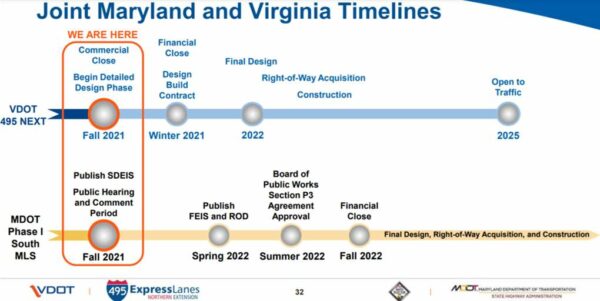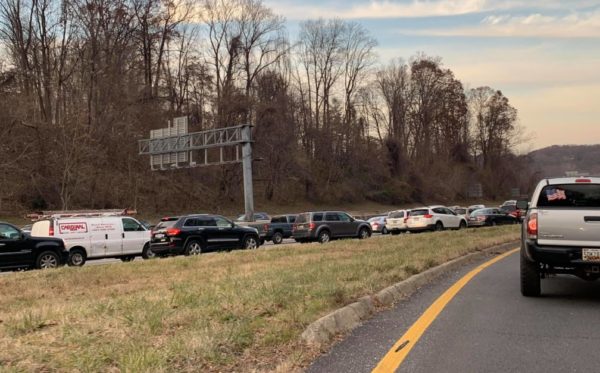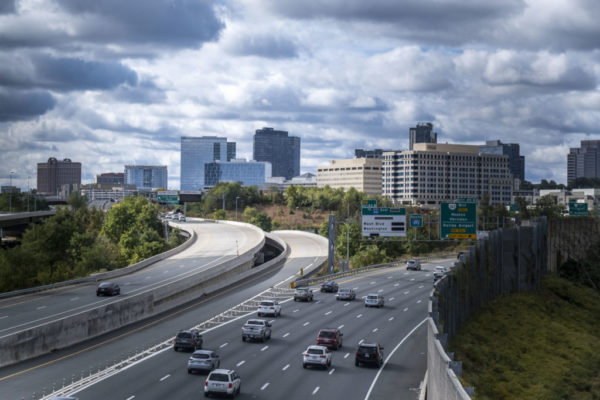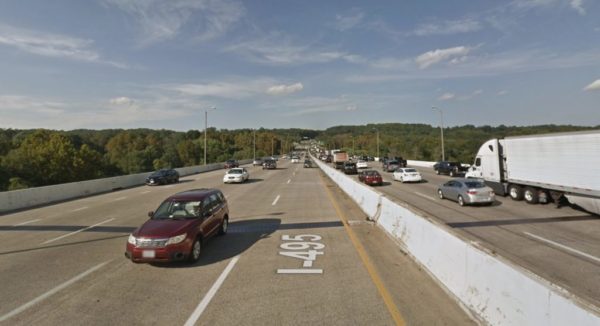Plans to extend the I-495 Express Lanes three miles north from the Dulles Toll Road in Tysons to the George Washington Memorial Parkway in McLean are moving full steam ahead.
Now backed by federal approvals, the 495 Northern Extension project (495 NEXT) is on track to develop a more detailed design this fall, Virginia Department of Transportation officials told Fairfax County leaders and community members at separate meetings last week.
With a financial close on a contract projected to come this winter and the design getting finalized next year, VDOT anticipates starting the right-of-way acquisition process and construction in 2022. The new toll lanes are scheduled to open in 2025.
While the project has faced skepticism over whether its benefits will outweigh the impact of construction on the environment and neighborhoods, state transportation officials say expanding the Capital Beltway to the American Legion Bridge — and, ideally, beyond it into Maryland — will provide needed relief at one of the worst traffic bottlenecks in the D.C. region.
“I’ve never heard anyone say the American Legion Bridge is great,” VDOT Chief Deputy Commissioner Rob Cary said during a virtual public information meeting on Wednesday (Sept. 29). “It’s an issue. Everybody knows it’s an issue, and this project is going to move forward and fix that.”

The additional capacity created by the new express lanes will allow for transit across the Potomac River that’s currently stymied by the amount of congestion on and around the bridge, VDOT Northern Virginia Regional Transportation Program Susan Shaw told the Fairfax County Board of Supervisors’ Transportation Committee last Tuesday (Sept. 28).
VDOT has committed to introducing bus service between Tysons and Montgomery County in Maryland as recommended by a study that the Virginia Department of Rail and Public Transportation and Maryland Department of Transportation completed in March.
VDOT will provide $5.2 million to purchase buses, and contracted Express Lanes operator Transurban has agreed to cover the transit service’s operating costs with $2.2 million per year once tolling begins, according to the presentation delivered at both of last week’s meetings.
At Fairfax County’s urging, the state has been looking at the possibility of launching the bus service before the new toll lanes open, especially since Shaw admits conditions “will be degraded some” during construction, which could last into fall 2027, when Maryland expects to open its Beltway toll lanes.
“Those years of degradation are what really concern us,” Providence District Supervisor Dalia Palchik said at the transportation committee meeting. “So, getting ahead on transit and a program to really get people on transit, out of their cars during that congestion, I think, would be very helpful to be successful.”
However, it will be difficult to provide consistent, timely bus service until the express lanes are available, Shaw says. Read More
Virginia’s plan to extend the I-495 Express Lanes to the George Washington Memorial Parkway in McLean, just south of the American Legion Bridge, is now one step closer to becoming a reality after the project received key federal approvals late last week.
The Federal Highway Administration (FWHA) and National Park Service (NPS) both determined that the I-495 Express Lanes Northern Extension (495 NEXT) project would have no significant environmental impact based on an assessment submitted by the Virginia Department of Transportation, which announced the news on Friday (July 9).
FHWA also approved the project’s interchange justification report, which analyzed the potential traffic impacts.
The approvals allow VDOT to move forward with the design and construction process, even as many community members and local elected officials remain skeptical that the project should advance with Maryland’s Capital Beltway expansion plans in limbo.
“This is an essential step toward bringing relief and multimodal solutions to a section of I-495 that faces daily congestion and unreliability,” VDOT Deputy Commissioner Rob Cary said in the news release. “We are appreciative of the collaboration and partnership from our federal partners, as we work together to implement the best possible solutions to improve travel on the Capital Beltway and in our region.”
Signed on June 29, the FWHA Finding of No Significant Impact (FONSI) considered the project’s implications for surrounding communities, land use, historic properties, water and air quality, noise, and other factors.
The report says building the proposed three-mile toll lanes extension “could result in short-term reduced water quality, floodplain impacts, and forest and wetland impacts,” but the impacts could be minimized with “the implementation of state-mandated best management practices and conformance with current stormwater regulations.”
“Overall cumulative effects of the project are not expected to be significant,” FWHA says in the report. “In addition, current regulatory requirements and planning practices help to avoid or minimize the contribution of present and future actions to adverse cumulative effects for socioeconomic, natural, and historic resources.”
According to the NPS FONSI approved on June 7, 495 NEXT would permanently affect 0.9 acres of George Washington Memorial Parkway because land is needed to tie the project into the existing interstate near the American Legion Bridge. 1.3 acres of park land would be temporarily affected during construction, including the clearing of forest canopy and plants.
Still, the park service concluded the impacts will be minimal compared to the anticipated benefits of the project, which VDOT says will reduce traffic congestion, improve trip reliability, and support more travel options, with the addition of a shared-use path from Lewinsville Road to Live Oak Drive and bus service between Virginia and Maryland.
“The Build Alternative will result in both beneficial and/or adverse impacts on the Park,” the NPS said. “However, the NPS has determined that the Build Alternative can be implemented without significant adverse effects.” Read More

Maryland Rejects Beltway Widening — The Maryland-National Capital Park and Planning Commission unanimously voted against widening the Capital Beltway, which Northern Virginia leaders have been hoping will help ease congestion around McLean [Maryland Matters]
Vienna-based Parcel Carrier LaserShip Launches Hunger Relief Program — “LaserShip launched the [Time of Need] program with a $10,000 charitable donation to Food for Others, a hunger relief organization in northern Virginia. As part of the commitment, LaserShip is providing delivery services to help Food for Others transport food from its warehouse to a distribution center in Annandale, Virginia. Food for Others feeds over 2,600 local families each week.” [LaserShip]
Vienna Students Participate in Virtual Army 10-Miler — “Teachers, staff members, parents and a student from the Madison High Pyramid completed the virtual Army 10 Miler this weekend, and put an FCPS twist on their walk.” [Patch]
Photo courtesy Craig Fingar
(Updated at 10:15 a.m.) Tysons area commuters heading to and from Maryland on the Beltway may see some relief from the constant traffic woes.
The governors of Virginia and Maryland announced an agreement Tuesday morning that would see the construction of a new American Legion Bridge.
The agreement to rebuild the bridge is being billed as “historic” and “a big win for Northern Virginia, the metro region, and our entire Commonwealth” by Virginia Gov. Ralph Northam (D).
The new bridge will “relieve congestion at one of the country’s worst traffic chokepoints,” according to a press release, below. “The project is expected to cut commuting time in half for many travelers, reduce congestion in the regular lanes by 25 percent, provide 40 percent more lane capacity over the old bridge, and include bicycle and pedestrian paths across the Potomac River.”
The new bridge will be build on largely the same footprint as the existing bridge, but with two new express lanes in both directions. The initial stages of construction could begin as early as 2021.
Proud to stand with @GovLarryHogan to announce our new, historic Capital Beltway Accord. Finally, our two states have come together to rebuild the American Legion Bridge—a big win for Northern Virginia, the metro region, and our entire Commonwealth.https://t.co/lamx5p3zqr pic.twitter.com/av4wOhzYjI
— Ralph Northam (@GovernorVA) November 12, 2019
More via a press release from the governor’s office:
Governor Ralph Northam (D-VA) and Governor Larry Hogan (R-MD) today announced a bi-state, bipartisan accord to create a new, unified Capital Beltway, replace the aging American Legion Bridge and relieve congestion at one of the country’s worst traffic chokepoints. The two governors made the announcement at the annual Capital Region Transportation Forum in Washington, DC.
“A new bridge means commuters will get to work and back home faster,” said Governor Northam. “Our teams have identified a way to fix one of the worst traffic hot spots in the country. This demonstrates what can get done when leaders come together to find shared solutions to tough regional problems. This is about helping people see their families more, grow their businesses, and further unlock the region’s vast economic potential.”
“The ‘Capital Beltway Accord’ is a once-in-a-generation achievement for the capital region,” said Governor Hogan. “A bipartisan, commonsense, interstate agreement such as this has eluded elected leaders throughout the region for many decades. Together with our partners in Virginia, we are building a foundation for even greater economic growth, greater opportunity for our citizens, and advancing real, lasting, transformative improvements for the entire Washington metropolitan region.”
The project complements ongoing plans by both governors in their jurisdictions–advancing a region-wide vision for a seamless network of reliable travel options around the Capital Beltway, and along Interstates 270 and 95, 395, and 66.
The project is expected to cut commuting time in half for many travelers, reduce congestion in the regular lanes by 25 percent, provide 40 percent more lane capacity over the old bridge, and include bicycle and pedestrian paths across the Potomac River.
The American Legion Bridge has been operating beyond its capacity for nearly four decades. Daily traffic has grown 390 percent since the bridge opened in 1962, with 235,000 vehicles using it daily. More than 40 percent of the region’s population travels this segment of the Capital Beltway, and the region expects to grow by another 1.2 million people by 2040. Both governors have made it a top priority to identify a long-term, seamless solution for the Capital Beltway.
The project will replace the existing lanes in each direction across the Potomac River and add two new Express Lanes in each direction for approximately three miles between the George Washington Memorial Parkway in Virginia to the vicinity of River Road in Maryland. New bicycle and pedestrian access will connect trails on both sides of the Potomac River. The project is being designed predominantly within the footprint of the existing bridge and right-of-way to minimize impact to travelers, the environment, and surrounding communities. No homes or businesses are expected to require relocation.
“This is once-in-a-generation project that will improve accessibility throughout the region,” said Virginia Secretary of Transportation Shannon Valentine. “This is a milestone in regional cooperation. We in Virginia look forward to working hand-in-hand with Maryland to deliver this transformative transportation solution.”




